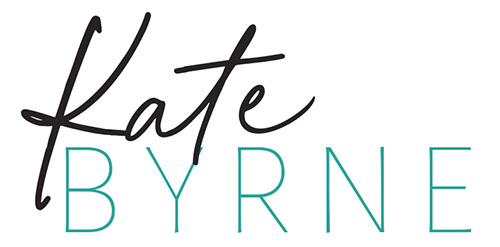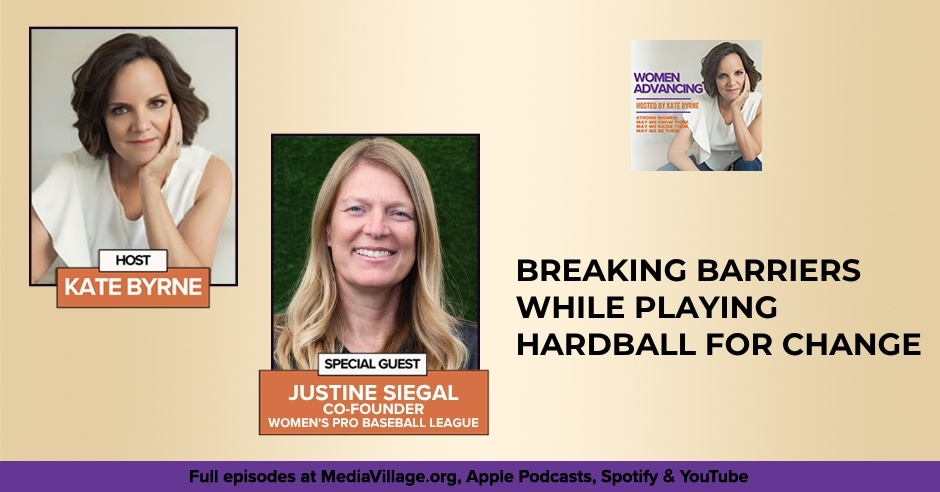
Breaking barriers in baseball isn’t for the faint of heart, and Justine Siegal has made a life of doing just that. The co-founder of the new Women’s Pro Baseball League and founder of Baseball For All joins host Kate Byrne to share her journey from being told “girls don’t play baseball” to becoming the first woman to coach for a Major League Baseball team. Justine reflects on resilience, purpose, and the courage it takes to keep showing up when you’re the only one on the field. Justine and Kate dive into what it means to turn “no” into motivation, how confidence grows through preparation, and why inclusion and visibility remain the real game changers. As she readies for the League’s first player draft, Justine reminds us that every swing at the plate is a step toward lasting change.
—
Watch the episode here
Listen to the podcast here
Women’s Pro Baseball League Co-Founder, Justine Siegal Breaking Barriers While Playing Hardball For Change
You Think I Can’t? Well Watch Me!
I can’t stand it when someone tells me I can’t do something. It drives me crazy. Think about it, we’ve actually got two choices when that happens. You can either believe them or you can prove I’m wrong. My guest, Justine Siegal, has made a career out of choosing the second option. At age thirteen, her coach told her she couldn’t play baseball, he didn’t want her on the team. She went on to make sure that he regretted it.
Fast forward, she’s now the co-founder of the first professional women’s baseball league, looking to have their first draft on November 20th, the first woman to coach for a major league baseball team, the first to throw batting practice to the pros and the founder of Baseball For All, a nonprofit, giving girls everywhere the chance to play, coach and lead the game they love.
In our conversation, we talk about what it takes to be a serial disruptor. Are you born one, or can that be taught, someone who changes the rules instead of just playing them? We dig into courage, we dig into persistence, the power of showing up even when you’re laughed at, and sometimes, especially when you’re laughed at, and why creating space for others is the most radical leadership of all. Whether you’ve ever been underestimated, told to play softball, or simply asked to just shrink, this one’s for you because as Justine reminds us, you can’t be what you can’t see, so she’s making sure we all can be sure to stay to the end for KB’s Takeaways and game on.
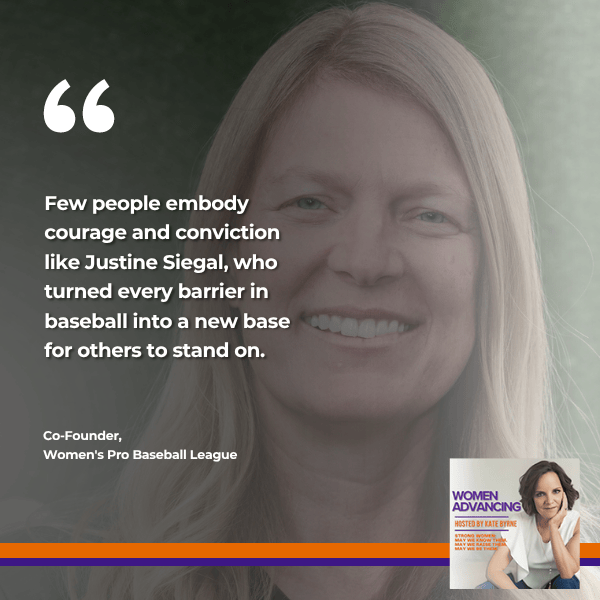
I’m so excited post-World Series to be able to have this conversation with the woman who broke the barrier by being the first woman to coach the MLB Instructional League and to pitch a group. She’s gone on to be the co-founder of the Women’s Pro Baseball League, which you’ll learn a little bit more about, and the Baseball for All. She’s the Founder of that as well. Who is this illustrious woman? None other than Justine Siegal. Justine, welcome, welcome to Women Advancing.
Thanks for having me. It’s a pleasure.
Defying Expectations: Justine Siegal’s Origin Story
So many barriers broken, which takes so much, I guess a certain amount of defiance. Let’s start there. You’ve described that moment when you were thirteen, and tell us about that. What was that moment like when somebody said to you, “You can’t do that,” and how did that shift and what did you do?
I grew up playing baseball, along with everything else. I was always on my bike. I had a really great time playing baseball in my local league. When I was about thirteen, I was given a new coach, and I remember he waited for everyone else to leave. It would just be me and him. I remember I’m just a kid. I was very tall and big and he said to me that he didn’t want me on his team and that girls play softball. I didn’t say anything back, but I was just thinking like, “I’m going to play forever.”
Now you’ve done it, buddy.
There was just something inside of me that just said like, “Why? What have I done?” It wasn’t because of my skill, and so it just felt wrong, and when it felt wrong, I just decided to keep going. Admittedly, that was the beginning of my uphill battle. I didn’t notice the discrimination before when I was young. People said stuff to me occasionally, but I didn’t put it together.
That was a big moment for me because I really had to just start deciding what I wanted to do. Did I want to keep playing baseball? Did I want to keep asking for permission to play baseball or I could just go to softball and, frankly, just be a softball star and have all these friends and be celebrated instead of having to go against a brick wall as a child, really.
Born A Disruptor? The Evolution Of A Trailblazer
That is ridiculous. Looking back, do you think you were born a disruptor? You must have been to a little bit? Did that defiance evolve as a self-protection in a world that said no way too often?
I don’t think anybody’s really just born leaders. When they say leaders are born, I think definitely leaders can be made. Yes, I will say that I’ve always had a sense of justice my entire life, looking to see what was right, what’s the right thing to do. It doesn’t mean I always did it, but I was always looking for it. My favorite month in elementary school was February where we learned about Black History Month, when we just learned about just the power of the Civil Rights Movement things like that. Unfortunately, there was also a women’s right movement that no one decided to tell me about. It was this idea that we could make change. That’s something that I just was always very inspired by.
Also devoted to. As you’ve seen, because you’ve achieved this stunning amount series of firsts as I alluded, first woman to coach for a Major League team, first to throw MLB batting practice. That often comes with, to your point, you just referenced it, I could have done softball, I would’ve had a lot of friends, I would’ve been celebrated. This way, you’ve ended up going through and experiencing a lot of isolation and scrutiny. How do you stay grounded? What kept you on the course?
I think as youth under eighteen, it’s just pure stubbornness. I loved baseball and the more people tried to take it away, the more I loved it. I really had to practice more than other people because it wasn’t enough to just be like an average person. Not that I was great, but everyone stops to watch to see if I can throw the ball correctly. That was true even as an adult. They stopped to see, “Does she bring her arm back?” It’s just something that the harder it got, the more I loved it. It was hard. It was very hard. I was a very shy kid, so it was more on principles. I think I kept playing them, probably common sense.
That was also amazing when I think about that. How do you balance between being like the best coach or being labeled as the woman coach, which was, of course, “Justine, she’s the lady coach.” I can already hear it in my head as opposed to, “Coach Siegal.”
Beyond The Label: Becoming Coach Siegal
I think that age matters. I’m right. I got Title IX, but I was still at the somewhat beginning of Title IX. I played soccer with boys. At my first high school, I was the only girls played two sports that were boys sports, so soccer and baseball. Of course, now everyone plays soccer. I think my age is relevant to the historical aspect of the story. I was 15 or 16 when I decided I wanted to be a baseball coach. I told my coach who coached at camp, who I worshiped, that I wanted to be a coach. He laughed at me and he said, “No man would ever listen to a woman on a baseball field.”
For me to share my dream, because I was so shy, it was very difficult. My stomach dropped. As the day went on, I started thinking like, “Who is he? Who is he to decide and how can I make this happen?” I started like creating a pathway in my mind of what was possible. I started right then and there, like, “How do I become a better coach? Let me learn as many positions as I can.”
There were definitely times where, especially when I was younger, like, “You can’t coach. You’re a girl.” They had me coach 5-year-olds instead of 12-year-olds. I’m older than the boys who are coaching the twelve-year-olds. If we’re all camp instructors, I’m older than everyone, but I’m coaching five-year-olds, and they’re coaching these high school kids.
They have that much more experience than everybody. There you go.
I ended up becoming a college baseball coach. I was an assistant coach at Springfield College through the graduate program. I can definitely say that while it was surprising to have a woman coach in the beginning, and I think a little bit of that’s changed now, but once you show you know what you’re doing, once you show that you care about them, once you show that you can win, that’s all they care about in the end. There’s a surprise. Men come in and it’s assumed they know what they’re doing, whereas I think women probably still now have to show that they know what they’re doing for the most part. I was fairly well received and I ended up coaching there at the college level and then professionally and internationally.
How did you make the jump from college level and then to was it international? Did it go college international and then professional?
I met Mike Veeck. If anyone’s a baseball historian, he was part of the Disco Demolition that happened with the Chicago White Sox. He also had helped Ila Borders become a professional baseball player with the men. I went up to him and said I’d like to coach for him. In the end, I ended up coaching with the Brockton Rocks while I was getting my PhD in Sports Psychology at Springfield. I was able to coach at that assistant level and then go into the independent pro baseball. That was very difficult because it hadn’t been done before, and so not everybody agreed, but once I crossed that barrier, then things started to get not easier, but I was able to at least show what was possible.
You had this track record of breaking down and opening the way.
I threw BP to Major League teams, and that made a lot of history. I got invited to scout school. That’s where I realized that there’s a loophole. There was a loophole at the time in Major League Baseball where they would allow international coaches to come in and coach for instructional league, which is in the fall for players they want to get more work in. I’m like, “If they were willing to do that, then maybe they’re willing to let me in,” because I’m out of the pipeline. I’m out of the traditional pipeline.
I went back to Billy Bean, who was the first person to say I could throw batting practice too. I was like, “Can I come Coach?” He said no. Every year, for four years, I would ask him. I would just say like, “I got my PhD. I’m a scout,” just making myself better and better. In the fourth year, I got a yes. I actually coached for ten days with the Oakland A’s Instructional League, and it took a lifetime to get there. Those ten days was like the light bulb that said this is possible. After me, other women got an opportunity to coach
The Power Of A PhD: Sports Psychology In Coaching
That is absolutely huge. I ask that question because one of the things in the corporate realm, and in boards, oftentimes, while it’s still hard for women to get executive roles in the States, same thing with on certain boards, often it is easier to go overseas, internationally and get it, and then enter through the side door that way. I was just curious if there was some parallel there with the sports world. It seems like there is. Now you’ve got this PhD in Sports Psychology. Sometimes these things are helpful, sometimes they’re too theoretical, they’re not practical. How did it influence your coaching style?
I decided to get a PhD when I was 15 and 16, creating that plan. I didn’t know how I was going to do it because I have learnings and learning disabilities, but I was like, “If I don’t have the same playing opportunities as men, I figured I’d out educate them. That was my plan. No one was giving me these ideas. I just came up with them. For better or worse.
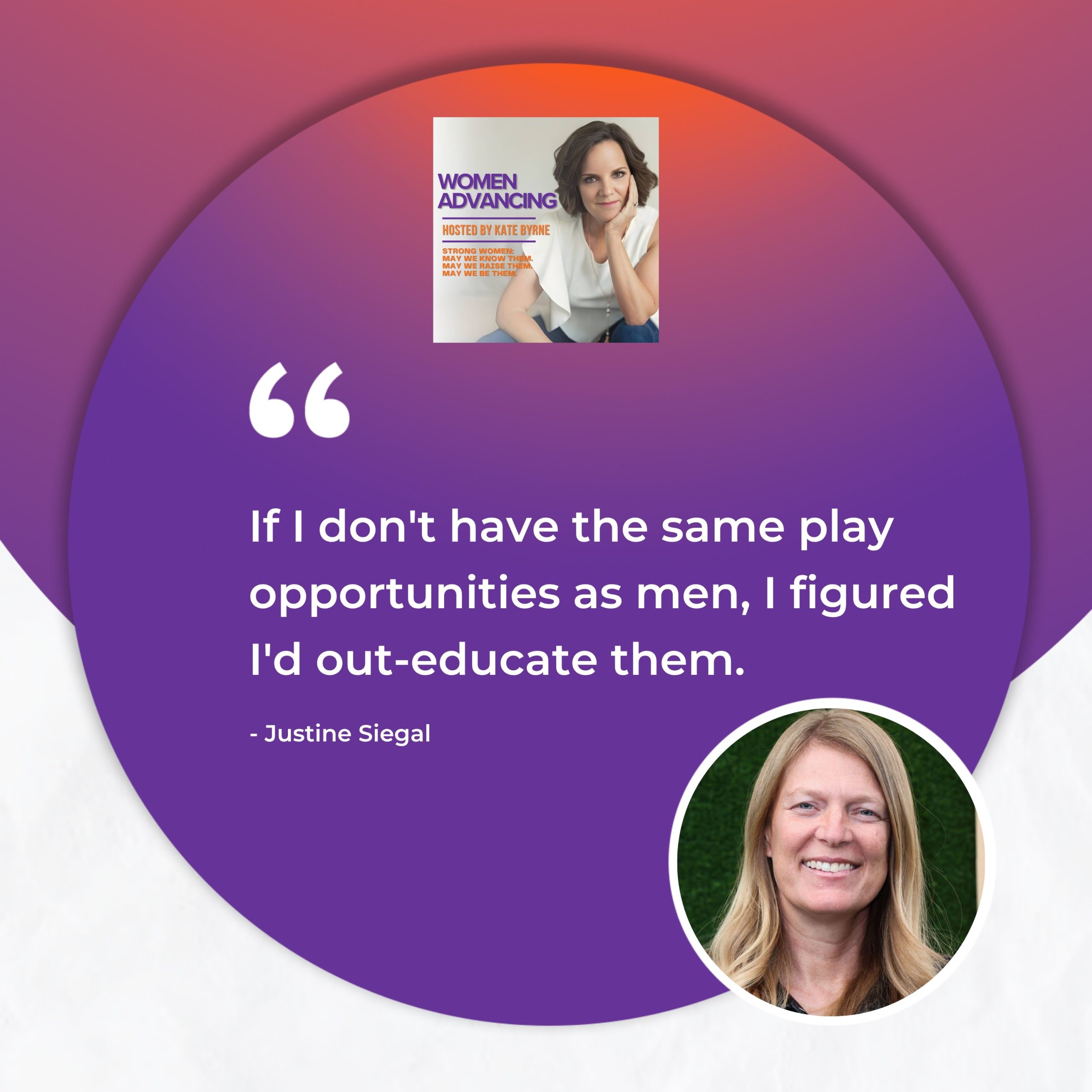
These are all workarounds and it’s smart.
I did end up getting to coach at the college level because I was pursuing a PhD. It was an easier sell than coming in cold the other way. I was already at school. I think that, for me, my PhD in Sports Psych, it wasn’t just theoretical. Yes, I could have focused on the theoreticals, I could become a researcher, but it just became who I am. More of me. How do I identify motivation? What’s the best way to communicate? How does someone else learn best?
Those are things you just start, it just becomes in how you’re relating to your player and your team. Of course, I know skills of how to help with concentration so forth. Often, just how you’re able to make another person their best selves is understanding who they are. I think I was able to do that with my Doctorate. Get a better jump on it at least.
Helping someone become their best self starts with truly understanding who they are. Share on XYeah, because I would think too, that in certain situations, especially if you’re the one female voice and you’re out there coaching and leading, are there some go-to practices that you have to help? When you see a player rattled and you can literally see them just getting in their head, you’re like, “You’re going to just mentally mind F yourself out of this whole situation.” How do you like, interject and intervene? It’s a lot like when you’re, again a manager, a corporate leader, and you’re seeing a producer go down the tubes for some reason or another.
Everyone is different, but being available. There are certainly players that I sat down next to on purpose and I have a pretty easy-going vibe. I definitely heard troubles of all kinds from having trouble hitting to having trouble with their girlfriend. I heard all of it. I think having that feeling availability allows people to come and ask for your troubles. A great example of this, and one of the reasons why I can really just say, at least I know I’m proof that diversity matters, is that when I was with the a’s, I was there a short time, but my job was not to teach pitting or teach pitching. I was just in a support role.
There was a guy who was having trouble hitting, and we are surrounded by former pro players. They’re all coaches, they’re former players, they’re all the things that people say you have to be to be a good coach. He’s having trouble hitting, and he decides to come to me with this trouble and he shares it with me. He shares what’s his challenge. I’m able to give him a response that comforts him.
He didn’t go to the others, he came to me because this is where he felt safe and that’s a bonus of diversity. He comes, I’m able to give him what he needs, and he goes down, he hits a home run and then the next half out, he hits a double. It’s just proof that the more people you can get on your staff, the more people you’re going to reach.
Right, who offer differing opinions and different vibes for that matter. Now let’s talk a little bit about preparation because I know one of the things you’ve shared is confidence comes from preparation. What does that look like for you mentally, emotionally, physically, before walking into a room where you’re going to be, where you most likely be underestimated? Although I can’t believe that still happens, and please tell me it doesn’t happen anymore.
I would say that you get underestimated. I think there’s still a lot of women in sports who aren’t necessarily given the full freedom like, “You’re good at this, do this,” but not in the same way that they might give a male peer. For preparation, for me, it’s just repetition and practice. Physically, that’s something. If you think of an athlete, a lot of it is repetition. I just happen to know that if I go into the batting cage, which is what I would do, and just hit 95 miles an hour, that when it comes in at 75, that’s slow.
The more people on your staff, the more people you're going to reach. Share on XThat’s just one easy way that I got through high school. I got through high school hitting. When it comes to public speaking, for example, I might say to myself like, “Just speak with your heart, an opportunity to serve.” I’m not really changing what I’m preparing other than resetting my mindset and what I’m focused on.
Launching A Legacy: The Women’s Pro Baseball League
Now let’s talk about the big thing, the big behemoth, the Women’s Pro Baseball League that I know you are launching in 2026, which is such a huge milestone. I know you’ve got a virtual draft coming up.
We do. I welcome everyone to follow us on socials because it is going to be an online draft, and you’ll be able to see it all. Just follow our socials. Things are changing. Things are growing so quickly. It’s the best way to stay on top of everything. Sometimes, even I find out this is happening because there’s so many things and we have more than me working on the league. Someone in social, someone grabbing our next sponsor and so on.
Talk a little bit about how did you come up with this idea?
I didn’t come up with this idea. Of course, women in baseball have come up with the idea of pro baseball for a long time. It was just a matter of how was it going to happen. My co-founder, Keith Stein, did some research on who he wanted as a partner. He thankfully came up with me and he called and said, “Will you do this league with me?” It was pretty easy to say yes.
Twist my arms. Are you at liberty to share how many teams we can expect, or is that all going to depend on the draft size? How does that all work?
We have four teams. We’re playing in a neutral site for the first year, meaning one site, all four teams. We’ve identified our cities, which is Boston, New York, LA, and San Francisco as our first top four cities. When we go into ‘27 and ‘28, we’ll be looking into those cities as to where our hosts are. While we’re single entity modeled now, we’re looking at franchises in the future, in the next few years. Four teams is really just the beginning to what will soon become an 8, 12 and more late. It’s very exciting not just because the players will have a chance to showcase how good women are in baseball, but we’re also creating ecosystem where women won’t be overlooked for jobs that are on and off the field.
None of us are perfect, no matter who's up on that podium. We're all just getting through, and while there are so many beautiful things about life, life is also hard, and we should be here for each other. Share on XThat’s what I was exactly thinking. It’s so much beyond the field is, but that’s one part, but there’s that whole quilt of people that is involved, that tapestry of people that actually help make it look go beyond.
Certainly. Obviously, there’s wonderful men out there who are fun to work with and champion women. We’ll be hiring men as well, but no one has to walk on the field and show that they know what they’re doing. We get the same respect because we’re here.
I was just going to say, to me, that’ll be one of the best parts, and I think we’ll encourage other entities to do similarly. I think it’s great. It’ll literally be an integrated group effort, men and women working together, doing this and recognizing it. That just shifts everything hopefully from this point on. In your mind then, what does success look like for the league beyond the scoreboard, as you would say?
Success is fans. We want fans to watch our games, to come out, to grab a hotdog, bring their friends, bring their family, have an affordable night out on a summer evening, which to me is the greatest, some summer evening at a ballpark and seeing women play baseball at such a passionate level. We’re one of the few sports where women don’t have a counterpart. We have played with men. We played with boys, we played with men. Now we get to play with other women.
There is a refinement in that and just a deep passion of a lifetime of work, of overcoming to get to those moments. You’re going to see that in the play. Also, you’ll be able to watch streaming. We’ll be announcing our broadcasting rights and obviously social media. You’re just going to fall in love with these women and their stories.
Baseball As A Mirror: Inclusion, Leadership, And Change
I just think it’s fantastic that it’s all happening. Here’s the thing. Baseball’s always been America’s pastime or whatever, but some have said it’s been something of a mirror for society. With that, what is baseball teaching us now about inclusion and leadership and change?
I’d say sports is a great reflection. It’s also a vehicle that we can make social change. I just remember my grandfather. I said, “Did you root for Jackie Robinson?” We’re Jewish. He is like, “Yeah, he represented all of us. We were all rooting for him.” Immigration and everybody coming in with different religions, so I know that sport can create social change.
I think in baseball right now, over 40% of Major League Baseball fans are women, and yet, we hand girls a different ball. That seems crazy to me. It’s just not a knock on softball. It’s just crazy to me. It’s very exciting that now there’ll be pro softball and pro baseball for women, so that girls can see that both sports are there for the.
They can choose, as opposed to having it chosen for them.
Yes, or having to ask permission to be there.
That latter part is the worst part of all. It doesn’t surprise me. You’ve said one of your greatest prides is your fiercely independent daughter. I know. I love them. I’ve got two myself. Good thing. How has motherhood informed your leadership?
I had my daughter in college, so my daughter has been with me my entire adult life. We were always in talks because I always wanted to put her first, but at the same time, she understood that I had this goal of mission. I started a nonprofit what Is now Baseball for All because when I had my daughter, it was a light bulb moment for me to see that there’s more than my career that I could create something better for the next generation. If my daughter wanted to play baseball, there’s no way I was going to let her go through what I went through.
That then becomes a symbol for all of the daughters to get a chance to play. I think the first was just a shift in paradigm. Just a shift that it’s not just me. It’s now us, but it’s also a future. There was that, but also, just on my hardest days, the days you want to quit and you just come home and there’s that love. It’s just enough to fill your tank and go out again the next day.
Motherhood, Mentorship, And A Message To Her Younger Self
Isn’t that the truth? I think it’s really true. It’s a great reminder. I would think, especially in your situation, with everything you faced and handled and endured, exactly that. Looking at that smile, it’s like, “i want to do everything I can.” You have as few days like I feel right now in your future. In closing, knowing what you know now, if you could go back and say something, whisper something in the ear of you, your younger self, what would you tell her?
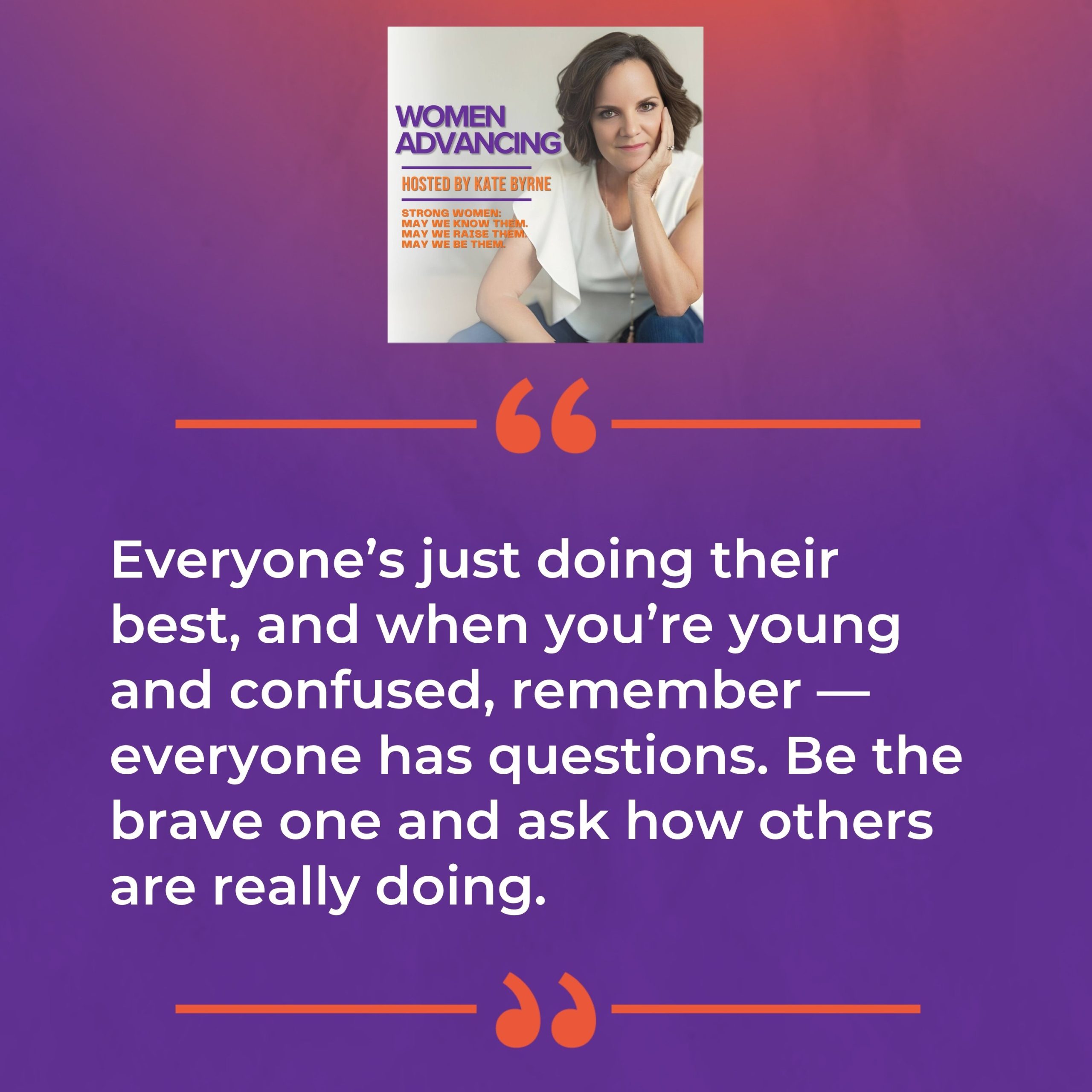
I think I’d set out and did what I thought I would do. I never thought baseball would become my whole life, really. Honestly, I loved soccer. I thought I’d be a college soccer coach. It seems like a pretty good life. As a shy child, I would’ve said that people around me, my peers did not know what they were doing either. I’m not the one odd man out. We’re all odd men out, and we all are just trying to follow each other’s cue and get there. I think that would’ve made me feel a little less lonely if I had known that everyone was struggling to find their way.
It’s something that we need to remind ourselves as women and as a community. We may have a stronger center of who we are, but we’re all still struggling and new pathways and new obstacles that we’re going through. None of us are perfect. No matter who’s up on that podium, we’re all just getting through and there’s so many beautiful things about life, but life is also hard. That we should be here for each other.
Have each other’s back. Frankly, there’s always something that one can teach others. Also, on the flip of that, there’s so much you can learn from every single person, whoever passes your life. There are no coincidences. Justine, thank you so much for making the time. I want to make sure everyone knows November 20th is the day of the draft, right?
Yes. Come onto our socials, but check it out now because we’ve got a lot of preview and we’re announcing where we’re playing this summer.
That is really exciting. We’ll have all that information. I’ll do everything I can to rabble rouse and spread the word.
I appreciate it.
My audience know I’ve got a big mouth.
Yes. I promise fun and a good time when you come to a game.
That’s huge. Justine, thank you for everything that you’re doing. I really appreciate it.
Thank you.
All right. Until next time.
—
Key Takeaways: Making Yourself Available And Showing Up
Wasn’t that great? It never ceases to amaze me how some of the people who are making the biggest shifts and causing the greatest changes in true systems are often more likely than not mild-mannered, but they’re persistent and consistent, and they’re not getting distracted by all the hoopla and fanfare that can come about as a result. That, to me, is actually one of the takeaways.
Number two is the power of when somebody says, no, you can’t, the power of the human spirit and turning right or around and saying, “Okay, yeah. Watch me.” Lastly, this whole notion that everyone is really doing the best that hopefully for the majority people are really trying to do. They don’t know. Everyone’s trying to do the best that they can. When you’re young and confused, just know everybody has questions. Go ahead, be the brave one and ask what’s going on with those around you.
I will say, please join me on November 20th for the live draft for the Pro Women’s Baseball League. If you are reading this later, go check out their site. Buy the tickets for those four teams, San Francisco, LA, Boston, and New York. There’s going to be so much, and let’s just watch this movement unfold. Until next time. Game on.
Important Links
About Justine Siegal
 When she was 13, Justine’s coach told her that girls are only supposed to play softball – not baseball. At that moment, she vowed she’d never quit. At the age of 16, she set her sights on becoming a college baseball coach. Despite being ridiculed, laughed at, and told no man would ever listen to a woman on the baseball field, she worked toward her goal, growing even more determined to realize her dream.
When she was 13, Justine’s coach told her that girls are only supposed to play softball – not baseball. At that moment, she vowed she’d never quit. At the age of 16, she set her sights on becoming a college baseball coach. Despite being ridiculed, laughed at, and told no man would ever listen to a woman on the baseball field, she worked toward her goal, growing even more determined to realize her dream.
After earning her PhD in Sport Psychology from Springfield College, Justine became the first woman to coach for a Major League Baseball Organization (Oakland Athletics, 2015) and to throw batting practice to a MLB team during Spring Training (Cleveland Indians, 2011). In 2016, she served as Mental Performance Coach for Team Israel at the MLB World Baseball Classic Qualifier. Off the field, and onto the screen, Justine served as a Baseball Coordinator for the tv show, A League of Their Own. She is currently a First Base Coach for Baseball United, a men’s professional baseball league in the Middle East and South Asia.
Justine is giving back to the next generation with Baseball For All, a nonprofit she founded to provide opportunities for girls to play, coach, and lead in baseball. She is an inductee of the National Women’s Sports Museum and has been named as an Everyday Hero by espnW. Her A’s jersey is in the National Baseball Hall of Fame in Cooperstown and her youth uniform is in the Smithsonian. Justine will tell you her greatest achievement is raising her fiercely independent, 26-year old, daughter.
